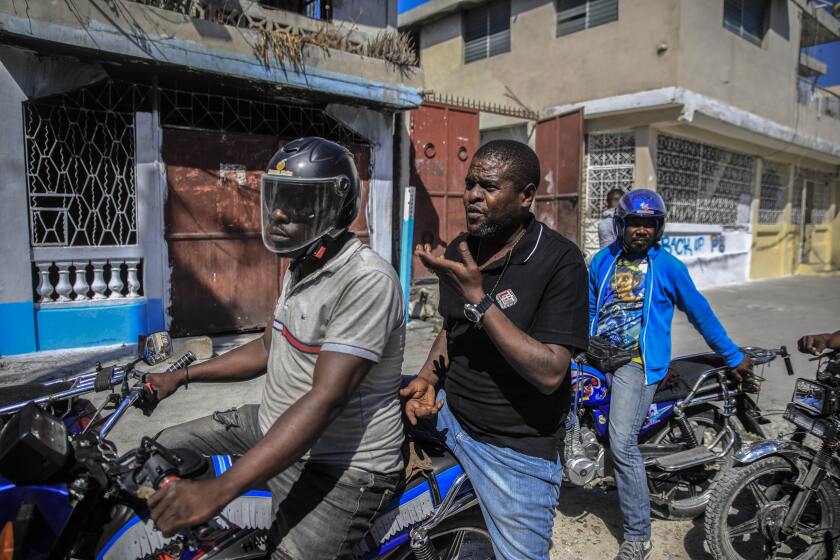Dominican Republic closes all borders with Haiti

- Share via
DAJABON, Dominican Republic — The Dominican Republic shut all land, air and sea borders with Haiti on Friday over a dispute about construction of a canal on Haitian soil, as armed Dominican soldiers patrolled entry points and military planes roared overhead.
Flights were canceled and border towns usually teeming with vendors and Haitians crossing daily to work in the Dominican Republic were subdued. Crowds of people on the Haitian side gathered under the shade of trees as they observed the scene on Friday.
It was unclear how long the rare closure of the borders will last, with Dominican President Luis Abinader saying the measure will remain in place “as long as necessary.”
The diplomatic crisis began earlier this month when workers in Haiti resumed construction of a canal near the Massacre River that runs along the border to help alleviate a drought that hit Haiti’s Maribaroux plain. The river is named after a bloody clash between Spanish and French colonizers in the 18th century, and was the site of a mass killing of Haitians by the Dominican army in 1937.
Abinader says the canal would affect Dominican farmers and the surrounding environment, while Haiti’s government insists it has the sovereign right to decide how to use its natural resources.
The closure is a deep economic hit for both countries that share the island of Hispaniola, although Haiti is expected to feel it more acutely.
“It’s really a very drastic measure that doesn’t make sense economically for either the Dominican Republic or Haiti,” said Diego Da Rin with the International Crisis Group. “This will clearly have very bad consequences economically in the Dominican Republic, and it will very likely worsen the humanitarian situation mostly in the areas close to the border.”
Haiti is the Dominican Republic’s third-biggest trading partner, with $1 billion in exports to Haiti last year and $11 million in imports, according to the Dominican Republic’s Export and Investment Center.
Meanwhile, a study by the Dominican Republic’s Central Bank found that $430 million in informal border trade was conducted in 2017 between the countries. Of that amount, more than $330 million consisted of exports to Haiti.
Armed men such as ‘G9 Family and Allies’ gang leader Jimmy Cherizier are filling the power vacuum left by a crumbling government.
Officials from the two countries met on Wednesday to discuss the situation, and were still meeting on Thursday when Abinader announced he would close all borders on Friday, prompting the Haitian government to criticize what it called a “unilateral” decision.
“Clearly, Abinader is overreacting to what is now a diplomatic incident,” Da Rin said, noting that Abinader confirmed last month he is running for reelection. “Maybe Abinader thinks this is a way to portray himself as a strong nationalist leader who will be the only one ... able to really stop the ‘Haitian invasion’ as he always calls the growing migration influx.”
Abinader announced this week that he has stopped issuing visas to Haitians and closed the border near the town of Dajabon. He also has pushed to limit the number of Haitians migrating to the Dominican Republic and has expelled tens of thousands of them and those of Haitian descent. His administration has started building a 118-mile wall along the Haitian border that he announced early last year.
Abinader said his administration is still in conversation with Haiti’s government but insisted that work on the canal must stop. Haitian officials have said the project will continue.
“I really don’t know how this decision of closing all borders with Haiti will go on for months,” Da Rin said. “Maybe for weeks. After that, this could really get out of hand, with Haitians trying to go illegally through the border.”
Coto reported from San Juan, Puerto Rico.
More to Read
Sign up for Essential California
The most important California stories and recommendations in your inbox every morning.
You may occasionally receive promotional content from the Los Angeles Times.











